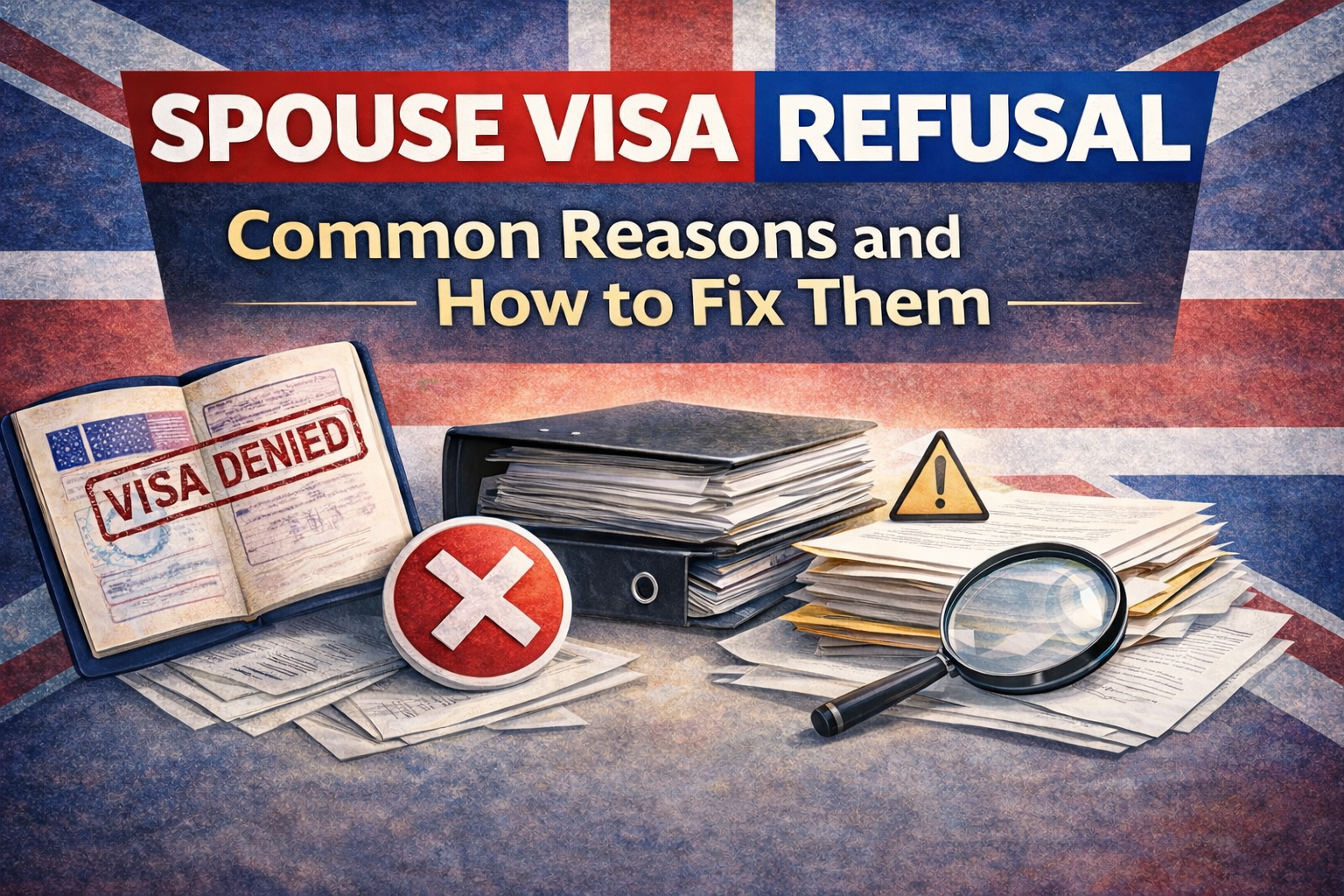Reasons UK Visa Applications Get Refused — And How to Avoid Them
Visa refusals can be emotionally and financially devastating. In 2025, rejection rates for UK visa applications remain high — particularly for family, visit, and work-related routes. This comprehensive guide outlines the most common reasons for visa refusals and offers practical tips to improve your chances of success.
Why Are So Many UK Visas Refused?
The Home Office applies strict criteria to every application. Any missing evidence, inconsistencies, or failure to meet the requirements can result in an immediate refusal. In some cases, errors could lead to re-entry bans or years of delay.
1. Failing to Meet the Financial Requirement
One of the leading reasons for refusal, particularly in spouse, partner, or dependent applications.
Key issues include:
- Income below the required threshold (e.g., £29,000 for spouse visas)
- Inadequate payslip or bank statement evidence
- Mixing different income sources incorrectly
- Relying on savings without proper documentation
How to avoid:
- Use up-to-date payslips, employer letters, and six months of bank statements
- Clearly show your income meets the requirement on its own or combined
- Use the Home Office’s financial appendix forms where applicable
2. Lack of a Genuine Relationship
For spouse or partner visas, failing to demonstrate a genuine and ongoing relationship can trigger a refusal.
Mistakes include:
- Sparse or inconsistent communication evidence
- No shared financial or household responsibilities
- Marriage certificates alone with no supporting proof
How to avoid:
- Provide multiple forms of evidence: photos, messages, letters, shared bills
- Keep your timeline consistent and well-documented
- Prepare a relationship history or cover letter (optional but useful)
3. Incorrect or Missing Documents
Missing paperwork is one of the easiest ways to get refused.
Examples:
- Submitting photocopies instead of originals
- Not translating non-English documents
- Outdated or expired forms
- Forgetting the Tuberculosis (TB) test for listed countries
How to avoid:
- Use the official UKVI document checklist
- Translate and certify all foreign-language documents
- Double check passport and visa validity dates
4. Inadequate English Language Evidence
Most visa categories require the applicant to meet minimum English standards (usually A1, A2, or B1 CEFR).
Refusal causes:
- No valid English language certificate
- Taking the wrong test or using an expired result
- Not exempt but claiming exemption incorrectly
How to avoid:
- Use only Home Office-approved English test providers
- Book your test early and include the TRF number in your application
- Check if you’re exempt (e.g., nationality, degree in English)
5. Failing the “Genuine Intent” Test (Visit or Study Visas)
Applicants for visit or student visas must prove they’ll leave the UK at the end of their stay and follow visa rules.
Common red flags:
- No ties to your home country (job, property, family)
- Insufficient funds for your trip
- Vague or unrealistic itinerary
- Applying for the wrong visa category
How to avoid:
- Provide return flight bookings, employment letters, or property ownership
- Show clear reasons to return home after your stay
- Include detailed trip plans (flights, accommodation, itinerary)
6. Criminal Convictions or Immigration History
The Home Office examines your background thoroughly.
Reasons for refusal include:
- Undisclosed criminal convictions (even spent convictions)
- Breaching previous visa conditions
- Overstaying or using deception in the past
How to avoid:
- Always declare your full immigration and criminal record
- Be honest about any past issues and include mitigating documents
- Seek legal advice if you have a criminal record
7. Poor Application Presentation
Even if you meet all the requirements, submitting a disorganised, unclear, or inconsistent application can harm your chances.
Red flags include:
- Contradictory information between documents
- Lack of cover letter or explanation of unusual aspects
- Spelling errors, missing sections, or incorrect uploads
How to avoid:
- Follow the application guidance carefully
- Use clear file names and well-organised document bundles
- Include a summary letter where needed
8. Wrong Visa Category
Applying under the wrong category or misunderstanding visa rules is surprisingly common.
Examples:
- Using a visitor visa to join a spouse long-term
- Applying for a student visa without confirmed CAS
- Using a family route when you should apply under skilled work
How to avoid:
- Read through the full visa category guidance on gov.uk
- Double check eligibility before applying
- If unsure, seek advice from a qualified immigration adviser
9. Insufficient Accommodation Details
For some visas (spouse, child), applicants must show adequate housing in the UK.
Refusal risks:
- No proof of property ownership or tenancy agreement
- Overcrowded housing based on UK standards
How to avoid:
- Include tenancy agreement, mortgage deed, or letter from host
- Attach property inspection report if necessary
10. Outdated Information
Visa rules evolve rapidly. An application based on outdated or old guidance will likely be refused.
Examples:
- Using 2023 salary thresholds in 2025
- Referring to old English test standards
- Using outdated document lists
How to avoid:
- Always check the official gov.uk guidance before applying
- Be wary of relying solely on forums or blogs
Appealing a Visa Refusal
If your application is refused, the next steps depend on your visa type.
Options may include:
- Reapplying with improved documentation
- Administrative review (if you believe an error was made)
- Full appeal to the First-tier Tribunal (only in certain categories)
Time limits apply, so act quickly.
Summary: Best Practices to Avoid a Visa Refusal
- Start preparing early
- Use a checklist to gather the correct documents
- Double check all financial calculations
- Include consistent, credible evidence
- Review all application answers before submission
- Seek legal advice if you have any doubts
With tighter immigration controls in 2025, a visa application is not just about ticking boxes — it’s about building a convincing case. Taking the time to understand and meet every requirement can save months of frustration and help you start your journey to the UK on the right foot.
Call Hi Solicitors on 01204 371414 to discuss your indefinite leave to remain queries.





